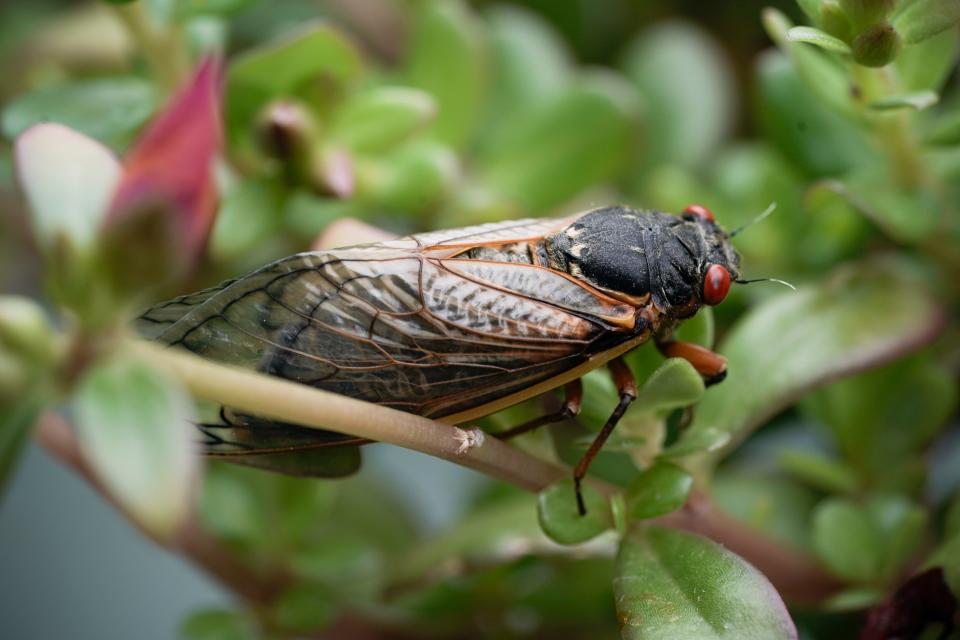Will Bucks County see cicadas this summer? What to know about the US brood invasion
Nature lovers will soon be treated to a pair of rare occurrences, but it looks like Pennsylvania may have to wait longer to be in the buzz.
After 13 years, Cicada Brood XIX is set to emerge in 14 states across the Southeast and Midwest, and the 17-year Cicada Brood XIII will emerge in five Midwestern states, according to Cicada Mania.
Brood XIX (19) is estimated to emerge beginning mid-May and lasting through late June. The brood last emerged in 2011, and has a 13-year life cycle.
Brood XIII (13) will emerge in mid-May and end in late June, and unlike the other brood, these cicadas have a 17-year life cycle. They last emerged in 2007.
This double emergence is the first time this has happened in 221 years. According to ScienceAlert.com, this won't happen again until 2245.
The two broods will begin to emerge when the soil 8 inches underground reaches 64 degrees, and are often triggered by a warm rain.
Will Pennsylvania see any cicadas emerge this year?
Pennsylvania isn't listed among the states that will have mass emergences of these two cicada broods, but the insect may show up in trees and lawns.
Here is a map of the states where the two cicada broods will emerge:
In-depth: 2024 cicada emergence map: The cicadas are coming: Check out a 2024 map of where the two broods will emerge
When was the last cicada emergence in Pennsylvania, and when will they emerge next?
Periodical cicada Brood X emerged in Pennsylvania in 2021, according to the Pennsylvania Department of Conservation and Natural Resources' report.
"Brood X is the largest brood of 17-year cicadas," read a portion of the National Park Service's factsheet on Brood X. "This brood is found in three separate areas centering around Pennsylvania and northern Virginia, Indiana, and eastern Tennessee.
"The largest emergence of Brood X appears as adults only once every 17 years."
Cicada emergence 2024: Cicadas 2024: 2 broods to emerge together in US for first time in over 200 years
According to published reports, nature lovers in Pennsylvania can look forward to Brood II emerging in 2030, and Brood IV emerging in 2034. Brood X will make a return in 2038.
What is a cicada brood?
According to the University of Connecticut, broods are classified as "all periodical cicadas of the same life cycle type that emerge in a given year."
A brood of cicadas is made up of different species of the insect that have separate evolutionary histories. These species may have joined the brood at different times or from different sources. These different species are lumped together under the brood because they are in the same region and emerge on a common schedule.
Are cicadas harmful to pets, the environment?
There's no need for alarm If the stray cicada does show up in your lawn or on trees, because they are harmless to humans and pets.
Are cicadas edible? Curious palates dig right into periodical cicada as Brood X emerges on East Coast
"Periodical cicadas may look a little frightening, but they are not harmful to us or our cherished animals; they do not bite or sting," read a portion of the the conservation and natural resource department's report. "Their clumsy flight pattern may be alarming, as sometimes they end up landing on people, but they’re easily sent on their way by simply brushing them off."
There’s also no need to be concerned about your dog or cat eating fallen cicadas.

And since cicadas provide protein to protein for insect-eating forest animals, birds and mammals, cicadas add nutrients to the ecosystem and food chain.
2024 cicada primer: Can cicadas bite? How to prepare when 'trillions' are expected to descend this summer
As a further bonus, the decomposing bodies of cicadas contain lots of nitrogen, which makes for good fertilizer.
And since Pennsylvania isn't one of the state expected to see a cicada emergence, the good news is residents won't have to deal with the buzzing noise caused by cicadas that can be as loud as a lawnmower, at about 100 decibels.
Damon C. Williams covers trending and regional developments for PhillyBurbs.com. Support our journalism with a subscription.
This article originally appeared on Bucks County Courier Times: Cicadas ready to emerge in US, but will they invade Pennsylvania?

